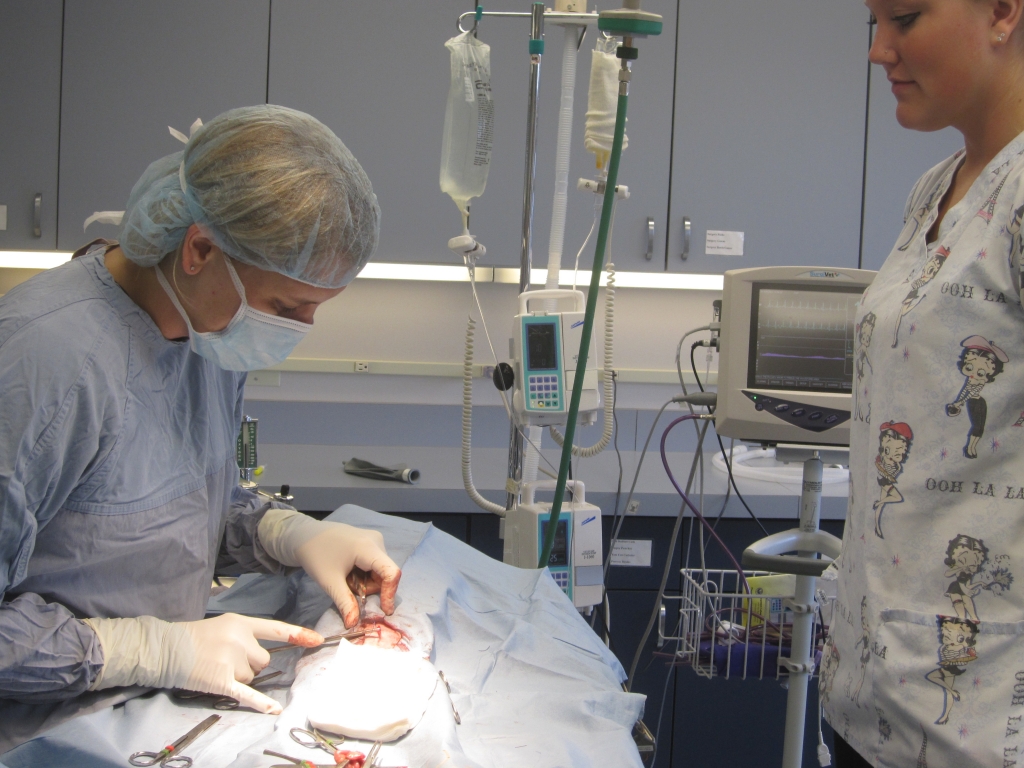|
What You Need to Know Before Your Pet's Upcoming Surgery
|

|
Many people have questions about various aspects of their pet's surgery, and we hope this information will help. It also explains the decisions you will need to make before your pet's upcoming surgery.
Is the anesthetic safe?
Today's modern anesthetic monitors have made surgery much safer than in the past. Here at Compassionate Care Animal Hospital, we do a thorough physical exam on your pet before administering anesthetics, to ensure that a fever or other illness won't be a problem. We also adjust the amount and type of anesthetic used depending on the health of your pet.
|
The handout on anesthesia explains this in greater detail.
Preanesthetic blood testing is important in reducing the risk of anesthesia. Every pet needs blood testing before surgery to ensure that the liver and kidneys can handle the anesthetic. Even apparently healthy animals can have serious organ system problems that cannot be detected without blood testing. If there is a problem, it is much better to find it before it causes anesthetic or surgical complications. Animals that have minor dysfunction will handle the anesthetic better if they receive IV fluids during surgery. If serious problems are detected, surgery can be postponed until the problem is corrected.
We offer three levels of in-house blood testing before surgery, your pet's age determines which lab work is necessary prior to anesthesia. Your surgery estimate will include the appropriate level of lab work needed for your pet.. Our doctors prefer the more comprehensive screen, because it gives them the most information to ensure the safety of your pet. For geriatric or ill pets, additional blood tests, electrocardiograms, or x-rays may be required before surgery as well.
It is important that surgery be done on an empty stomach to reduce the risk of vomiting during and after anesthesia. You will need to withhold food for at least 8 to 10 hours before surgery. Water can be left down for the pet until the morning of surgery. If your pet is currently on medication, please check ahead of time to learn which ones you should still give the morning of surgery. Diabetic animals typically are to have just 1/2 of their insulin dose the night before and morning of surgery. Once home they are to stay on just half of their insulin dose until they are eating well - normally about 24 hours.
Will my pet have stitches?
For many surgeries, we use absorbable sutures underneath the skin. These will dissolve on their own, and do not need to be removed later. Some surgeries, especially tumor removals, do require skin stitches. With either type of suture, you will need to keep an eye on the incision for swelling or discharge. Most dogs and cats do not lick excessively or chew at the incision, but this is an occasional problem you will also need to watch for. If there are skin sutures, these will usually be removed 10 to 14 days after surgery. You will also need to limit your pet's activity level for a time and no baths are allowed for the first 10 days after surgery.
Will my pet be in pain?
We firmly believe that we need to protect our patients from being in pain. Anything that causes pain in people can be expected to cause pain in animals. Pets may not show the same symptoms of pain as people do; they usually don't whine or cry, but you can be sure they feel it. Pain medications needed will depend on the surgery performed. Major procedures require more pain relief than things like minor lacerations.
We have many levels of pain preventatives. It has been determined in both humans and animals that we need to have pain medication on board prior to performing any procedure that will stimulate the pain receptors. Once the pain receptors are stimulated by pain - it is difficult to get enough drugs into the body to stop the pain. If given prior to surgery, it will prevent the pain receptors from becoming over stimulated.
We give each surgical patient narcotic injections 10-15 minutes prior to surgery. For any procedure more invasive that suturing a small laceration we start a constant drip of a combination of 3 drugs to stop any pain. This IV drip is than gradually weaned down over a few hours following the surgery and then the pet is switched over to oral pain meds. We may recommend an oral anti-inflammatory and a pain medication for 1-10 days(depending on the procedure) to lessen the risk of discomfort and swelling. We use newer which are less likely to cause stomach upset and can be given even the morning of surgery.
Because cats do not tolerate standard pain medications such as aspirin, ibuprofen, or Tylenol, we are limited in what we can give them. Recent advances in pain medications have allowed for better pain control in cats than ever before. We administer a pain injection 10 minutes prior to surgery. During surgery, we may use a local anesthetic to numb an area, IV combinations for a constant drip of the pain medication along with patches that can be applied 24 hours prior to surgery and deliver a constant amount of a narcotic to the cat for the next 4-5 days.
We use narcotic patches &/or lidocaine patches for surgeries in dogs as well. The cost will depend on the size of the dog. Injectable pain medications may also be used after surgery on both dogs and cats. Providing whatever pain relief is appropriate is a humane and caring thing to do for your pet.
What other decisions do I need to make?
While your pet is under anesthesia, it is the ideal time to perform other procedures, such as dentistry, ear cleaning, or implanting an identification microchip. If you would like an estimate for these extra services, please call ahead of time. This is especially important if the person dropping the pet off for surgery is not the primary decision maker for the pet's care.
When you bring your pet in for surgery, we will need to 5 to 10 minutes of time to fill out paperwork and make decisions on the blood testing and other options available. When your pet is waking up from surgery, the surgery technician will call to update you with how the surgery went and to schedule a definite 10 minute discharge period to go over your pet's home care needs.
We will call you the day before your scheduled surgery appointment, to confirm the time you will be dropping your pet off and to answer any questions you might have. In the meantime, please don't hesitate to call us with any questions about your pet's health or surgery.
| 




